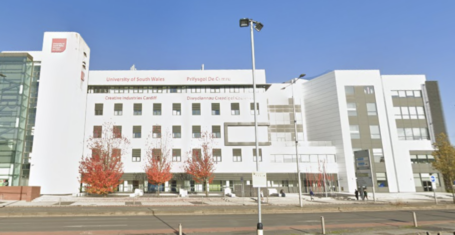
Here’s what Bristol Uni students think of renaming buildings linked to slave trade
‘This is something that should have happened ages ago’
Last term the University of Bristol announced that it would be launching a listening exercise to establish people’s thoughts on renaming seven of its buildings whose names are linked to the transatlantic slave trade. These buildings include the Wills Memorial Building, Fry Building, as well as Wills Hall and Goldney Hall.
With the results set to be published soon, The Bristol Tab asked students for their opinions on the potential renaming of these buildings and on other relevant matters. The interviews that were conducted resulted in a variety of opinions, showing that the decision-making process may not be as straightforward as it seems.
The same questions were posed to Dr Richard Stone, a senior lecturer in early modern history at the university, who has made significant contributions to the initial research that led to this consultation.
Would it be the correct decision to rename the buildings?
The challenging nature of the buildings’ names has made it essential for the university to launch this listening exercise. But what do students think of the names potentially being changed?
One student, who is a member of the African and Caribbean Society, said: “I think it is the best decision and it is a correct decision, I feel like this is something that should have happened ages ago.
“Having buildings named after individuals who represent things that have terrorised communities shouldn’t be happening, especially for an institution that claims to be inclusive”. This view was shared by the majority of students we spoke to, as they believed it was unquestionably wrong for buildings to be named after individuals who were complicit in the slave trade.
Most Read
Many students, while agreeing with the above point, felt that the university had to ensure that if the names did change then they would continue to tackle and prioritise the issue of inequality. A dentistry student said: “Otherwise it’s all just performative, the university need to make active anti-racism measures”.
While most students were pro-renaming the buildings, there were some who didn’t share this view. A medical student said: “I don’t think these changes are necessary. These things have happened in the past and the university should focus on promoting student and staff diversity and improving the current experience of people of colour”. This goes back to the danger of this being performative, showing that students want more direct action from the University.
What direction should the university go down if they need to select new names?

If the consultation results in the decision that the buildings should be renamed, then the next step will be selecting new names for these buildings. Due to the abundance of avenues that the university could go down, it will be difficult to decide what names these buildings should adopt.
“I would suggest renaming them after alumni who have gone on to be well-recognised and celebrated in their specific fields,” said one student.
However, Dr Stone raised an interesting point against this; he said: “I am wary of talking about things like alumni because that probably privileges one group or one identity over another”. Therefore, if the buildings were to be named after alumni, would the university be making itself any more inclusive?
When deciding what direction he would go down, Richard said: “I love the naming of Bristol Beacon, for example, because really simply it has Bristol in its name. This is Bristol. This is for everyone. So I think capturing something like that in the name might be really valuable”.
This idea wasn’t mentioned at all by the students, who tended to focus mainly on alumni, but also on influential minority figures. One student said: “I would love to rename the buildings after different influential people who have contributed to the end of slavery”.
Should the university’s crest and logo be changed?

The university’s crest also has links to the slave trade as it features the symbols of Wills, Fry and Colston; families that were complicit in the trade. For these reasons, the university has already committed to reviewing its crest and logo, so do students feel that it should be changed?
As with the buildings, the most popular opinion was that change is necessary. One student, studying sociology, said: “I don’t think it is a crest that should represent our university due to the negative connotations of what it represents”.
Dr Stone made a point which showed that members of staff generally agree with the students, he admitted: “Myself and a lot of colleagues won’t use it. So yeah, for me, it is a high priority to replace this”.
However, there were plenty of students who thought that the crest and logo should be left unchanged. One student raised a concern: “For some people, it could act as an important reminder of where the money in the university originated”. The university did need the money provided by the aforementioned families, however, does that mean their involvement in the slave trade should be ignored?
Another student told The Bristol Tab: “A logo change will do nothing to change black students’ experiences of racism in Bristol, feelings of segregation in all-white classrooms. I think the change of crest/logo is performative and is mostly for show”. This means that if these changes do go ahead the university will have to prove to its students that this is just the beginning of things to come.
What is to be made of the university’s decision to conduct a listening process instead of making its own decision?

Rather than making their own decision, the university chose to open up a listening exercise not only to students but also to members of staff and the wider community.
An engineering student told The Bristol Tab: “Whilst some may think this is the university trying to pass the responsibility of the decision on to the students and staff, I think it is important to get a wider consensus before making such large decisions”. This was a view shared by most students, who were happy that the university was letting their voices be heard. Many felt that this was something that the university had previously failed to achieve.
Another student raised a valuable point, they said: “I think this is a good idea as the people in the university who are making these decisions tend to predominantly come from a specific demographic so they may lack the nuanced views that individuals from a wide range of backgrounds could give”.
However, one student said: “I wouldn’t say they came to this decision alone, but more due to pressure and people constantly talking about it, writing emails in protest, and things like that”. This notion of the university succumbing to pressure popped up in a fair few interviews.
How can the university teach people about its difficult past?

The email that was released by the university, stated that “the complexity of our past could best be recognised through greater in-depth understanding and explanation”. This could be achieved in multiple ways, however, what the most appropriate method would be is an interesting debate.
“A section of the website could be dedicated to the university’s past so that individuals could educate themselves,” said one student. When looking on the website I discovered that while there was information on the university’s links with the slave trade, it was all under various sub-headings, rather than being clear and obvious. This is something that could be changed and it would give students an easy point of access to educate themselves.
Looking at the education provided directly by the university, one student said: “For me, I think it would be really good to offer an open unit to students across all manner of courses that educates us on Bristol’s complex history”.
However, another student went as far as to say: “I think there should be a compulsory module in every subject on something to do with race”. Whether it be an optional or compulsory unit, a lot of students agreed that it would be a good idea for the university to offer modules to teach people about our difficult past.
Related stories recommended by this writer:
• Bristol Uni student reached out to seminar tutor for help, then he asked her out for drinks
• Bristol University students are fourth most targeted by top employers
• City Council approve Bristol harbour for public swimming trial



















